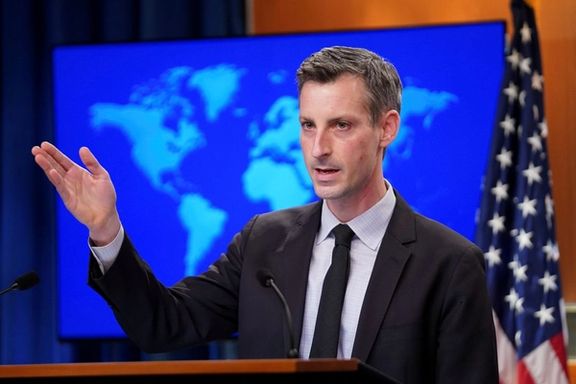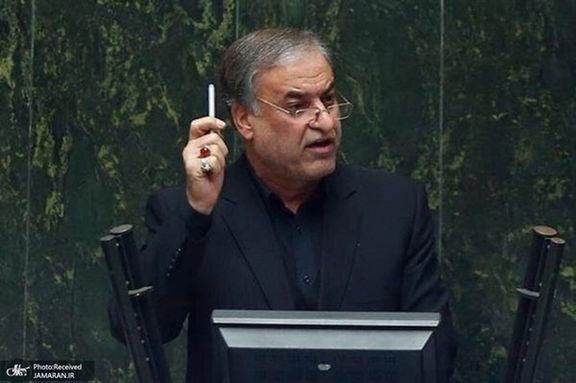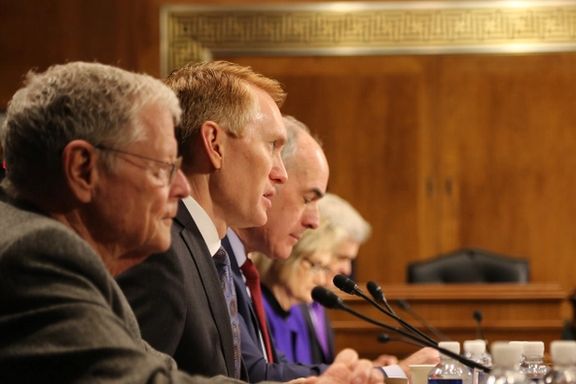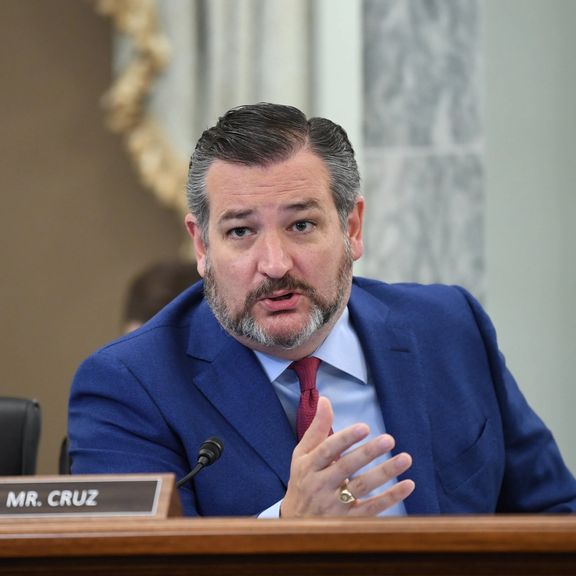Three-Quarters of Iran Sanctions Imposed On IRGC, Its Proxies

US State Department says most of the punitive measures against Iran is imposed on its Revolutionary Guard, putting them among the most heavily sanctioned entities in the world.

US State Department says most of the punitive measures against Iran is imposed on its Revolutionary Guard, putting them among the most heavily sanctioned entities in the world.
He added that “there are various authorities we can use when it comes to the IRGC... In addition to the FTO, there are a number of other authorities that are used to constrain and constrict its activities and those of its leadership and its proxies as well”.
“The fact is that we do have a number of tools, but whether it’s the SST (State Sponsor of Terrorism), whether it’s the FTO (Foreign Terrorist Organizations) designation, both of these things are defined by statute”, Price said in response to a question about their efficacy, adding that “we are going to follow the law. We’re going to do what’s in our national security interest when it comes to every authority under the sun”.
Talks to revive Iran's 2015 nuclear deal with world powers have stalled since March, chiefly over Tehran's insistence that Washington remove the FTO designation of the IRGC, which is the only example of a sovereign state’s armed forces to be included.

An Iranian lawmaker has called on the authorities to tell the people that the Vienna talks to restore the 2015 nuclear deal will yield no results.
Mahmoud Ahmadi-Bighash, who is a member of the parliament's National Security and Foreign Policy committee, said on Saturday that there is no news about the revival of the Joint Comprehensive Plan of Action (JCPOA) because it has reached a dead-end.
He said the fate of the JCPOA is entangled with the lives of people and they are subconsciously invested in the talks, therefore “if we tell people the truth about the JCPOA... they will know what to do”.
“Our differences with the United States and the Europeans are fundamental”, he noted, saying that “the Americans believe that we should give up our principles while we want them to give up their arrogant and bullying behavior”.
Ahmadi-Bighash added, “We cannot give up our revolutionary principles because they are inherent in our religious obligations”, claiming that the issue of the Revolutionary Guard being listed by the as a terrorist organization by the US is just an excuse.
He praised relations with Russia and China and emphasized the Islamic Republic's motto of "self-reliance", but except Israel, the lawmaker said, Iran should have relations with all counties.
Negotiations, which started in Vienna in April 2021 to revive the Obama-era nuclear deal, JCPOA, have been on a protracted pause since March 11, as the Islamic Republic demanded removing its Revolutionary Guard (IRGC) from a US list of terrorist organizations.

Iran’s currency, rial hit a four-month low on Saturday against the US dollar, as soaring bread prices created political and economic uncertainty in the country.
The US dollar rose to 285,000 rials in Tehran, the highest point since early January, when the currency was marginally recovering from previous lows on optimism over nuclear negotiations with the West. After talks in Vienna came to a standstill in mid-March, the currency began gradually losing its value again.
The rial has fallen almost ninefold since late 2017 when signs emerged that former US president Donald Trump intended to withdraw from the 2015 nuclear agreement, JCPOA, and impose economic sanctions on Iran.
Trump eventually pulled the United States out of the Obama-era agreement in May 2018 and imposed oil export and other sanctions that began to squeeze Iran’s oil-dependent economy. High double-digit inflation and a falling currency followed, leading to at least two years of a deep recession.
The falling currency makes everything else more expensive for people who earn depreciated rials. Key foodstuff, such as cooking oil, and 15 million tons of wheat are imported annually. In addition, animal feed is also imported and a falling currency makes meat and poultry more expensive. Most Iranians have stopped buying meat according to industry people in Iran.
This week the government finally acted on an earlier decision to stop a subsidy in the form of cheap dollars for imports of essential commodities, such as flour and animal feed. Immediately, cooking oil disappeared from supermarket shelves and flour prices increased fivefold, leading to a bread crisis.
The government’s handing of the price jump has been haphazard, claiming to be ready to provide cash assistance to citizens for buying bread but offering contradictory information on how the process would work. Pundits and citizens have reacted by saying that apparently the government failed to prepare for the eventuality.
There were reports on Friday of bread protests breaking out in the oil-rich Khuzestan province
President Ebrahim Raisi and his oil minister Javad Owji have been insisting that Iran’s illicit oil exports and revenues have risen in the past year, with evidence that Iran has been exporting anywhere between 750,000 to one million barrels per day. However, the economic impact of higher oil revenues is nowhere to be seen.
The key to lifting US sanctions and getting a reprieve form economic pressure is reaching an agreement with the United States over the nuclear issue, but talks in Vienna have stopped since mid-March.
As bread prices shot up almost fivefold in two days, economy minister Ehsan Khandouzi promised Saturday that the government will start a system of cash assistance to buy bread, but his statement was vague as to who what income groups would be eligible to receive the cash subsidy.
Meanwile, Hamshahri newspaper reported that the government is also planning to hike the price of cooking oil and gasoline, to begin reducing decades of subsidies paid by oil export income.
A gasoline price hike in November 2019 led to nationwide protests in which security forces shot dead at least 1,500 people and arrested 8,000.
Prices for all these commodities are very low in Iran compared to other countries, but so are wages. An Iranian worker earns an average of $150 per month and when one flatbread costs one dollar, the family can only afford to buy 3-4 breads a day, and nothing else.

The Biden administration's negotiating team have reportedly acknowledged in private that an agreement that would go beyond curtailing Iran’s nuclear program is no longer possible.
Politico cited multiple people familiar with classified Congress briefings on the subject that the two Iran-related motions passed in the Senate on Wednesday were a warning shot to the US team negotiating restoring the 2015 agreement with Tehran.
Although the motions were non-binding, the vote was seen as a test run of the bipartisan rebuke that would likely happen if Washington and Tehran clinch an agreement that does not address Iran’s non-nuclear activities and removes Iran’s Revolutionary Guard (IRGC) from the list of foreign terrorist organizations.
The measures -- that for the first time forced lawmakers to go on record about the key sticking points in the year-long negotiations in Vienna -- were also hailed as modest victory for Republicans who have been urging the Biden administration to walk away from the talks, now in limbo for weeks now.
The first vote on Wednesday was proposed by Senator Ted Cruz that called for maintaining terrorism-related sanctions on Iran’s Central Bank to limit Tehran’s cooperation for China, while the other – led by Senator James Lankford instructed Senate conferees to make sure that a House bill would include language that the Biden administration cannot remove the terror designation of the IRGC.

The United States Senate Wednesday sent a strong message to the Biden administration opposing its current negotiating posture on the Iran nuclear deal.
The Senate passed a non-binding measure as an instruction to Senate representatives who will work with the House on a larger bill. It secured the votes of 16 Democrats for a total of 62 senators in favor.
Important Democrats such as Senate Majority Leader Chuck Schumer (D-NY) and Sens. Richard Blumenthal (D-CT), Cory Booker (D-NJ), Ben Cardin (D-MD), Chris Coons (D-DE), among others voted for the measure.
The measure introduced by Sen. James Lankford (R-OK) opposes entering into an agreement with Iran that only addresses its nuclear program, leaving out the issue of ballistic missiles and regional role, and demands that US sanctions on the Revolutionary Guard (IRGC) not be removed.
The House of Representative and the Senate are set to push forward with HR 4521, a long-stalled bill authorizing hundreds of billions of dollars to boost the country's ability to compete with Chinese technology, with Senate votes on motions addressing issues including energy policy and Iran sanctions.
This requires reconcilitation between the House resolution and Senate demands to reach at a final bill. Wednesday’s Senate votes on sevaral measures are instructions to its conferees when they meet to reconcile with the House.
The Lankford measure that was passed with a strong majority was one of these instructions and told the Senate conferees to insist on "provisions addressing the full range of Iran’s destablizing activities, including development of the means of delivery for [nuclear] weapons…support for terrorism, and evasion of sanctions…in the trade of petroleum products with the People’s Republic of China."
It also instructed that sanctions on the Islamic Revolution Guard Corps not be lifted and not to revoke its designation as a Foreign Terrorist Organization.
Earlier on Wednesday, the Senate voted 86-12 - with strong bipartisan support - for a similar "motion to instruct", sponsored by Republican Senator Ted Cruz, seeking a report on terrorism-related sanctions on Iran and saying such sanctions are necessary to limit cooperation between China and Iran.
If they become law, the Lankford and Cruz provisions could complicate delicate negotiations on the Iran nuclear deal, although western officials have largely lost hope that the pact can be resurrected, four years after former Republican President Donald Trump abandoned it in 2018.

The US Congress edged closer on Wednesday toward completing a long-stalled bill that among other issues would request a government report on Iran‘s role in terorism.
Although the motions are not binding, they convey a sense of what senators would like to see in the final bill and what could keep it from getting enough votes to become law.
In one of an expected 28 votes, the Senate voted 86-12 - with strong bipartisan support - for a "motion to instruct", sponsored by Republican Senator Ted Cruz, seeking a report on terrorism-related sanctions on Iran and saying such sanctions are necessary to limit cooperation between China and Iran.
If it became law, the provision could complicate delicate negotiations on the international Iran nuclear deal, although western officials have largely lost hope that the pact can be resurrected, four years after former Republican President Donald Trump abandoned it in 2018.
Negotiations, which started in Vienna in April 2021 to revive the Obama-era nuclear deal, JCPOA, have been on a protracted pause since March 11, as the Islamic Republic demanded removing its Revolutionary Guard (IRGC) from the US list of terrorist organizations.
Sen. Cruz before the vote called on lawmakers to vote "Yes" if they want terrorism sanctions on Iran’s Revolutionary Guard to remain, or "No" if they want to lift those sanctions. He also accused the Biden administration of refusing to enforce oil export sanctions on Iran, allowing it to sell more than a million barrels of crude a day.
Iran International has also obtained text of a Motion to Instruct Senate Conferees by Cruz that calls for identifying "major areas of diplomatic, energy, infrastructure, banking, economic, military and space cooperation…between Iran and China, regarding US policy to limit such cooperation…through terror-rekated sanctions imposed on Central Bank of Iran and the IRGC, as such sanctions are necessary to limit such cooperation.“
Media reports have indicated that the US was contemplating to remove the IRGC from its Foreign Terrorist Organizations list and only keep its foreign operations arm, the Qods (Quds) Force under sanctions. Iran has rejected a partial removal of sanctions and insists on all designations to be removed.
Opposition to Biden Administration's efforts to revive the 2015 nuclear agreement has grown in recent weeks, with an overwhelming majority of Republicans and many Democrats opposing a return to deal and making concessions to Tehran.